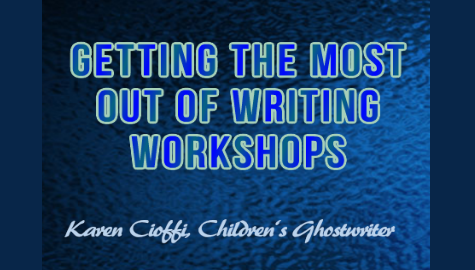Guest post by writing coach Suzanne Lieurance
Six Simple Ways to Make the Most of Any Writing Workshop or Writing Class
If you’ve recently signed up for a writing workshop or writing class, in the hopes of becoming a better writer, then follow these simple steps to make the most of that experience:
1) Read! Read! Read!
Before the very first class or workshop, survey ALL the class materials so you will get an idea of what to expect.
Most good writing classes (and workshops) will provide students with a wealth of helpful materials. But these materials won’t do you any good if you don’t bother to look at them. In fact, if you have time before the workshop starts, read as many of the materials as you can. You might not fully understand what you are reading. That’s okay. Learning is recursive – which means your understanding will increase each time you study or reread the information.
If you don’t have time to read the materials before the class begins, then at least look over all the materials beforehand. Also, besides the required course materials, if there are suggested additional materials, get those too. And read them!
Also, read the kinds of things you wish to write. If you want to write stories for children, READ stories for children. If you want to write culinary mysteries for adults, READ culinary mysteries for adults, etc.
SPECIAL NOTE: Also, realize this. If you don’t enjoy reading, then you probably won’t enjoy the work it takes to become a successful (by that I mean, published) writer. Published writers are like sponges – anxious to soak up any information about their craft that they can.
2) Carefully read the directions for each and every assignment and follow the directions TO THE LETTER.
I’m surprised that so many people pay for a writing course (like the one I taught for the Institute of Children’s Literature), yet a large number of these people don’t follow the directions for each assignment.
In some cases, it’s painfully evident that they didn’t even bother to READ the directions. What they need to understand is this – usually each assignment or lesson in a writing course or workshop was designed with specific objectives in mind. If the student doesn’t bother to read and follow the directions for each assignment, then the instructor has little chance of helping the student meet those objectives.
3) Avoid defending your work to your instructor.
Generally, students pay an instructor because he (or she) has some expertise and experience in writing, which usually includes many publishing credits. In fact, you should ALWAYS look for an instructor who has publishing credits. But then listen to what that instructor has to say about your writing, then follow his advice without trying to defend your work if it goes against what he has suggested.
Your instructor knows what he is talking about. For example, many times I tell students that in stories for children, adults should play very minor roles, and the child or teen in the story should always solve his own problem without a parent or other well-meaning adult stepping in to save the day. Many students want to argue that adults save the day for kids all the time in real life, so it should be okay that Aunt Martha calling at the last minute to offer little Janie the money she needs for summer camp is the perfect resolution for their story.
Sure, this kind of thing happens in real life. But, in stories for kids or teens, editors want the child to solve his own problem. Don’t waste precious time (yours or the instructor’s) arguing about something like this. Your understanding of WHY you should do what your instructor is asking you to do (or not do) will increase over time and study. Do what your instructor suggests, without defending your reason for going against his directions, and you’ll move ahead at a faster pace.
4) Learn to research all sorts of topics. In other words.
Don’t depend on instructors, editors, publishers, or anyone else to provide you with ALL the information you need in order to become a published writer.
Your instructor will probably give you research tips and marketing information, of course. But most published writers are self-directed learners. By that I mean, when they don’t KNOW something, they figure out HOW and WHERE to get the needed information themselves (more about how to do this, next).
5) Find other writers to network with and even hang out with, and read publications for writers.
Join a local writers’ group or at least sign up for one online (at yahoogroups.com you’ll find all sorts of groups for writers). Try to find a group that includes at least a few published writers. Generally, writers like to be helpful. They will usually share marketing tips, writing resources, etc. and will help you to more fully understand what you learn in a writing workshop or writing class.
Also, talk to some of the other writers in these groups to find out how they write. Then use some of their tips to improve your own writing, writing habits, etc. Hang out with the published writers and you’ll soon learn that they probably do a LOT of rewriting before they sell any of their work.
Read publications for writers to gain current marketing news and tips, and to find out how other writers became successful.
All these things will help give you the confidence to keep writing (and to keep practicing what you learn in your writing workshop or writing course) until you manage to get something published.
6) Don’t expect writing to be easy.
And, don’t assume that if it isn’t it must mean you don’t have enough talent to succeed as a writer, so you might as well drop out of the workshop or writing class.
Actually, most successful writers will tell you that talent isn’t the most important quality for success. The ability to follow directions (which will eventually come from an editor or editors) and the willingness to continue writing and rewriting, until at least some of the many rejection letters you get in the mail turn into acceptance letters, are much more important qualities for success as a writer. If you realize this BEFORE you start any writing workshop or writing course, you will be more likely to stick with it, even when the work gets difficult.

Suzanne Lieurance is an award-winning author and an experienced writing coach. For more writing tips and resources delivered to your e-mailbox every weekday morning, get your free subscription to The Morning Nudge from Suzanne Lieurance, the Working Writer’s Coach.

The Writing Elements Mix – Is There a Right Balance?
Striving to Be a Better Writer by Writing More
Submitting Queries – Be Specific and Professional

I’m a working children’s ghostwriter, rewriter, and coach. I can help turn your idea, outline, or manuscript into a book you’ll be proud to be the author of, one that’s publishable and marketable.
OTHER HELP I OFFER:
HOW TO WRITE A CHILDREN'S FICTION BOOK
A 200+ book that will help you write your own children’s book.
FICTION WRITING FOR CHILDREN eCOURSE
4, 8, or 12 Weeks / 9 Sections / Instructor Guided Self-Study Program
WRITERS ON THE MOVE SELF-PUBLISHING SERVICE
Self-publishing help for children’s authors (picture books and chapter books)
You can contact me at kcioffiventrice@gmail.com.


1 thought on “6 Tips to Make the Most Out of Writing Workshops”